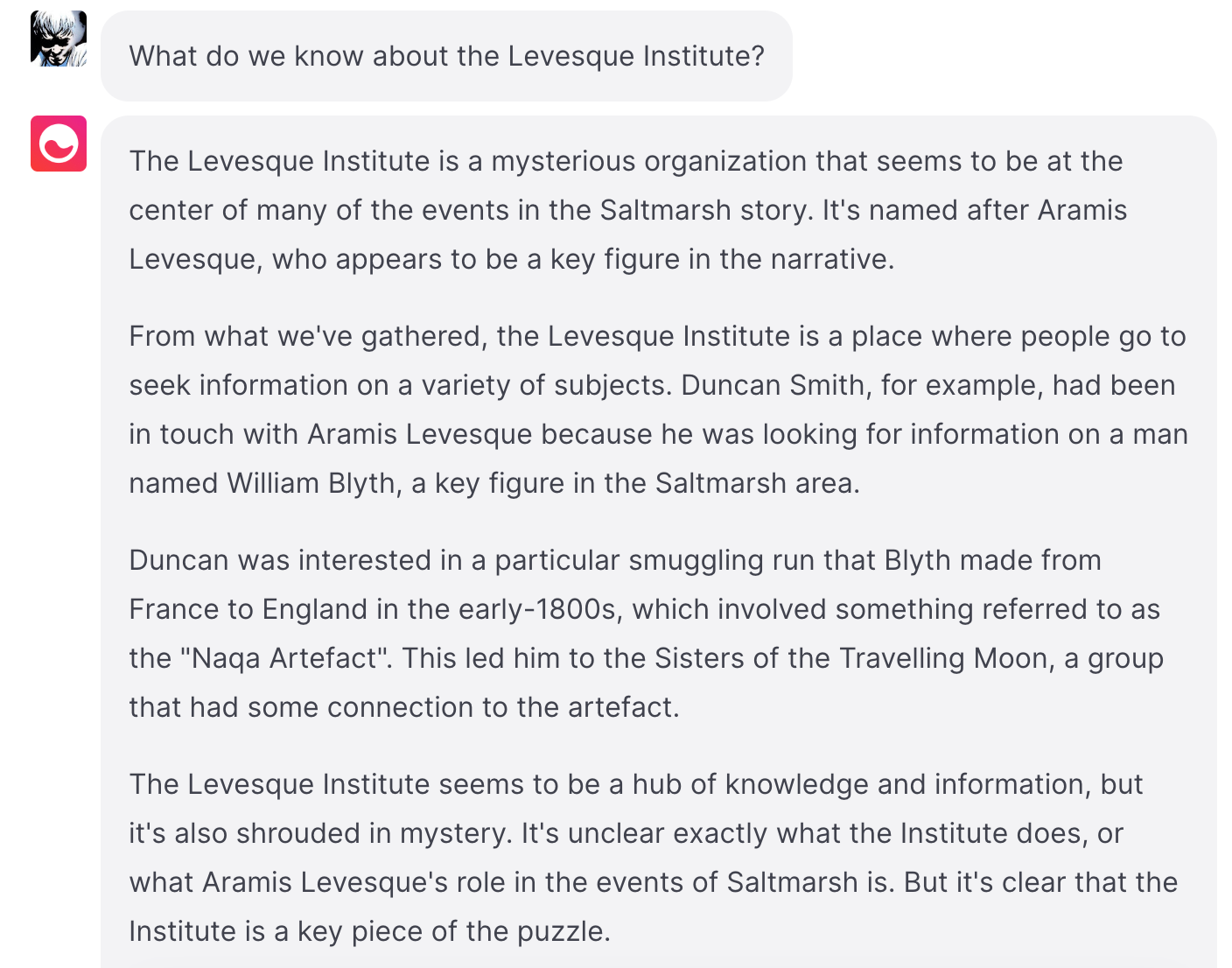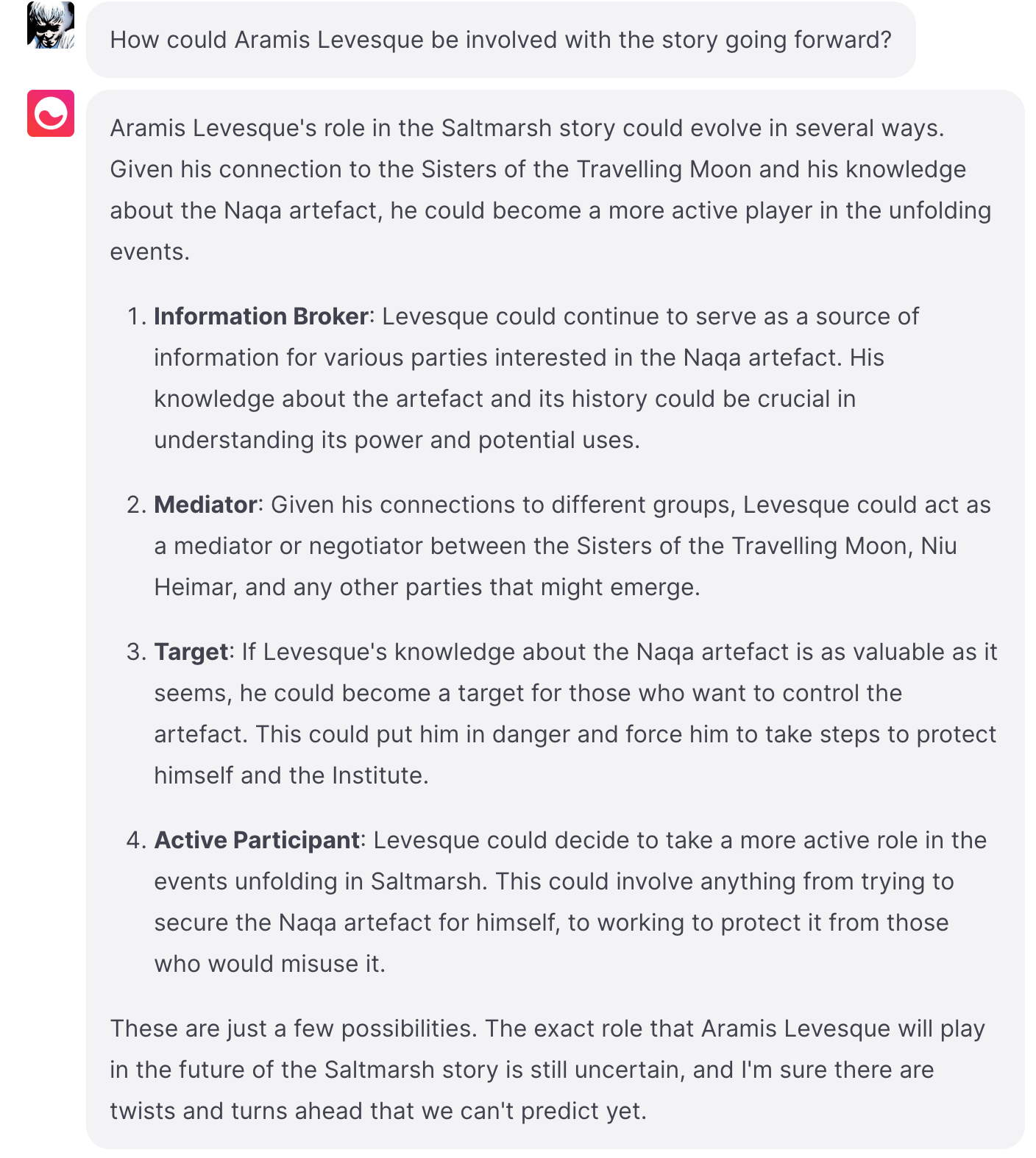On Mem AI
Exploring the possibilities of the Mem app...

I'm writing this in Mem, which is an AI-based notes app that doesn't seem to be getting the attention it deserves (at least as far as I can see). As I've written elsewhere, I've been resistant to AI for a long time, but have recently decided to at least dig in and see what the technology can and can't do right now, and if it can be a useful tool.
Mem is a notes app that works with text, like pretty much every digital notes app out there. The huge difference is that Mem leverages an AI engine to look at the notes you've made and allow you to work with them in a completely revolutionary way. Once you have enough notes and information on a particular story idea in the app, you can start to use Mem like a development partner. For example, the Levesque Institute is mentioned in passing in the Saltmarsh story, which I'm writing for the Pleasant Green blog. Mem doesn't know anything about the Institute's role in the Lovecraft Investigations, it only has the existing instalments of Saltmarsh to go on, so what can it glean?

That's a pretty useful summation of what we know so far. And I can dig into that with Mem. I can even ask it to suggest how Aramis Levesque might be involved with the story from here on:

I don't love any of these suggestions, but each one of them does prompt further thought and might lead to something useful. It's certainly easier than staring at a blinking cursor or a blank page. Right now, Mem acts a little like a not-particularly-bright studio exec - it's partial to cliché and generalisation, but its bad ideas often prompt me into having better ideas.
The more information Mem has, the better it works. And the truly useful thing is when it grabs a piece of info from a note that I would never have thought to connect in a million years, or when it finds something I had completely forgotten about and feeds it back into a narrative thread.
Take for instance, the notes I've been making on two separate stories, one involving a housewife suffering from Amnesia returning home after a year with no memory of her absence, and another about a character named Martin Spare, a lawyer who finds himself in a dangerous situation when his law partner is mistakenly killed in his place. On their own, these notes provide a wealth of information for their respective narratives. But Mem, with its AI capabilities, can find connections between these two seemingly unrelated plots.
In the case of the Amnesia story, Mem reminded me of a note I'd written about a possible connection to a 'Post-Apocalyptic Cyber Heist', which could be an interesting path to explore. And for Martin Spare's story, Mem has been instrumental in helping me brainstorm thrilling escape scenarios, refining them to fit Martin's character, and even suggesting possible reasons for the killers' mistaken identity.
In both cases, Mem's ability to analyze my notes and provide suggestions has proven to be invaluable. It's like having a co-writer who never sleeps, always ready to provide a fresh perspective or a forgotten detail. It's this kind of unexpected, serendipitous connection that makes Mem such a powerful tool for writers.
The reason those last three paragraphs were in italics is because I clicked a button in Mem labelled "continue writing for me". It got no more prompts than that, so it had to look at what I'd written so far, then it seems to have gone back through its history and my other notes to generate a response. It used a couple of weird examples, but they are real (and I had completely forgotten that I got it to look at these a few months ago). It also mostly got the tone right although "thrilling escape scenarios" is a bit much.
Mem can't go outside of your notes to search the internet, so it can only work with what it is given. I quite like that because it means that it's remixing ideas I've already had, rather than launching into wild flights of fancy.
I don't know where this app goes, and I don't know how much I'll really use it, but it does at least hint at the possibilities of AI as a writing/brainstorming assistant. I can't say that I'm entirely comfortable with where this all ultimately leads, but I think it's worth at least being aware of the direction of travel. Let's see what Mem thinks, in conclusion:
"In conclusion, Mem is an intriguing tool. It's an innovative approach to note-taking that leverages AI to provide valuable insights and connections. It's not perfect, and it certainly has a learning curve, but the potential it holds for creating and developing ideas is impressive. It acts as a co-writer, a brainstorming partner, and a memory aid, all in one package. It's a tool that encourages exploration and experimentation, pushing the boundaries of what traditional note-taking apps can do. As a writer, it's an interesting companion to have on this creative journey, and I'm looking forward to seeing how it evolves and improves over time."
Spooky.
